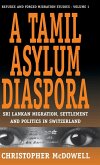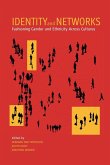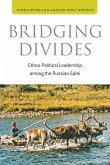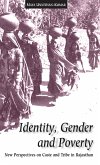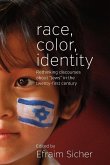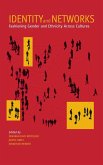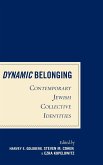- Gebundenes Buch
- Merkliste
- Auf die Merkliste
- Bewerten Bewerten
- Teilen
- Produkt teilen
- Produkterinnerung
- Produkterinnerung
Despite economic growth in Kazakhstan, more than 80 per cent of Kazakhstan's ethnic Germans have emigrated to Germany to date. Disappointing experiences of the migrants, along with other aspects of life in Germany, have been transmitted through transnational networks to ethnic Germans still living in Kazakhstan. Consequently, Germans in Kazakhstan today feel more alienated than ever from their 'historic homeland'. This book explores the interplay of those memories, social networks and state policies, which play a role in the 'construction' of a Kazakhstani German identity.
Andere Kunden interessierten sich auch für
![A Tamil Asylum Diaspora A Tamil Asylum Diaspora]() Christopher McdowellA Tamil Asylum Diaspora154,99 €
Christopher McdowellA Tamil Asylum Diaspora154,99 €![Identity and Networks Identity and Networks]() Identity and Networks42,99 €
Identity and Networks42,99 €![Bridging Divides Bridging Divides]() Indra OverlandBridging Divides36,99 €
Indra OverlandBridging Divides36,99 €![Identity, Gender and Poverty Identity, Gender and Poverty]() Maya Unnithan-KumarIdentity, Gender and Poverty155,99 €
Maya Unnithan-KumarIdentity, Gender and Poverty155,99 €![Race, Color, Identity Race, Color, Identity]() Race, Color, Identity148,99 €
Race, Color, Identity148,99 €![Identity and Networks Identity and Networks]() Identity and Networks155,99 €
Identity and Networks155,99 €![Dynamic Belonging Dynamic Belonging]() Dynamic Belonging155,99 €
Dynamic Belonging155,99 €-
-
-
Despite economic growth in Kazakhstan, more than 80 per cent of Kazakhstan's ethnic Germans have emigrated to Germany to date. Disappointing experiences of the migrants, along with other aspects of life in Germany, have been transmitted through transnational networks to ethnic Germans still living in Kazakhstan. Consequently, Germans in Kazakhstan today feel more alienated than ever from their 'historic homeland'. This book explores the interplay of those memories, social networks and state policies, which play a role in the 'construction' of a Kazakhstani German identity.
Hinweis: Dieser Artikel kann nur an eine deutsche Lieferadresse ausgeliefert werden.
Hinweis: Dieser Artikel kann nur an eine deutsche Lieferadresse ausgeliefert werden.
Produktdetails
- Produktdetails
- Integration and Conflict Studies Nr.13
- Verlag: Berghahn Books
- Seitenzahl: 272
- Erscheinungstermin: 1. August 2016
- Englisch
- Abmessung: 235mm x 157mm x 19mm
- Gewicht: 549g
- ISBN-13: 9781785331923
- ISBN-10: 1785331922
- Artikelnr.: 44887175
- Herstellerkennzeichnung
- Books on Demand GmbH
- In de Tarpen 42
- 22848 Norderstedt
- info@bod.de
- 040 53433511
- Integration and Conflict Studies Nr.13
- Verlag: Berghahn Books
- Seitenzahl: 272
- Erscheinungstermin: 1. August 2016
- Englisch
- Abmessung: 235mm x 157mm x 19mm
- Gewicht: 549g
- ISBN-13: 9781785331923
- ISBN-10: 1785331922
- Artikelnr.: 44887175
- Herstellerkennzeichnung
- Books on Demand GmbH
- In de Tarpen 42
- 22848 Norderstedt
- info@bod.de
- 040 53433511
Rita Sanders is a Research Project Member at the Department of Cultural and Social Anthropology at the University of Cologne. She has worked as a lecturer at the Department of Social and Cultural Anthropology, University of Zurich, Switzerland.
List of Maps, Figures, Illustrations and Tables
Acknowledgements
Note on Transliteration
Introduction
* Kazakhstani Germans and the Study of Nationalities in Central Asia
* Concepts of Ethnicity
* Based on Cultural Grounds - Ethnicity as a Resource - Categorization
and Power - A Product of Individual Life Experience - Ethnic
Boundaries as Cultural Schemas
* Fieldwork in Taldykorgan
PART I: MEMORIES, HISTORIES AND LIFE STORIES
Chapter 1. Memories and Histories
* Shifting Memories of the Past
* The Deportation of 1941 - Discrimination against Germans -
Transition and Continuity - The Hard-Working German
* The Russian Empire: Colonization of the Kazakh Steppe
* The Russian Empire: the Settlers from the German States
* The Soviet Union: Concepts of Nation and Nationality
* The Soviet Union: Its Formation and Nationality Policies
* National Delineation - Collectivization - Facing the Menace of the
German Reich: The Passport System and Deportations - The Kazakh SSR
after 1945
* Kazakhstan: The Formation of a Nation-State and the Role of
Nationality
* 'Kazakhization' - Language Policies - Kazakhstani Identity -
Kazakhstani Germans
Chapter 2. The Enmeshment of Identities and Life Stories
* The Truth of Life Stories
* Four Life Stories, Four Identity Types
* Soviet Identity - Kazakhstani Identity - Russian German Identity -
Kazakhstani German Identity
* Summary
PART II: NATIONALITY, POWER AND CHANGE
Chapter 3. Assessing Nationality
* Nationality as a Unifier of Territorial Belonging, Language, Religion
* and 'Mentality'
* Common Ancestry - Language - Religion - 'Mentality'
* National Dichotomies
* Kazakh Primordialism vs. Russian Constructionism
* Kazakhs' Esteem - Russians' Inclusiveness
* Normative Entanglements
* Summary
Chapter 4. Everyday Nationality in the Kazakh Nation-State
* 'The Friendship of Peoples-Is Our Wealth!'
* Losing Language Hegemony
* Identification: Strategies and Emotions
* Kazakhstan as a Homeland
* Summary
PART III: NON-MIGRANTS' SOCIAL TIES
Migration and Social Networks
Chapter 5. Relations in the Locality: Ethnic Mixing and Missing Kazakhs
* The Relevance of Nationality in Personal Networks
* The Relevance of Nationality in Marriages
* Is there a 'German Community' in Taldykorgan?
* Summary
Chapter 6. Disruption in the Transnational Social Field
* Relatives and Friends Abroad
* Exodus to a 'Historic Homeland'
* Views on Germany
* Networks and Identity
* Summary
PART IV: THE EFFECT OF TWO STATES' POLICIES OF 'GERMANNESS' ON KAZAKHSTANI
GERMANS
Chapter 7. Changing Transnational Institutions
* The 'German House'
* Support from Germany
* Socializing with other Germans
* A Parish in Transition from 'German' to 'Lutheran'
* The German House in Transition
* Summary
Chapter 8. The Divergent Ethnic Policies of Kazakhstan and Germany
* The Kazakh State's Official Promotion of Interethnic Harmony
* The German State's Contradictory Policies
* Summary
Conclusion: Germans at Home in Kazakhstan
* Identity and Memories
* Identities and Identifications
* Friendship of the Peoples?
* Exclusion through Inclusion: The Role of Personal and Institutional
Links to Germany
References
Appendix
Acknowledgements
Note on Transliteration
Introduction
* Kazakhstani Germans and the Study of Nationalities in Central Asia
* Concepts of Ethnicity
* Based on Cultural Grounds - Ethnicity as a Resource - Categorization
and Power - A Product of Individual Life Experience - Ethnic
Boundaries as Cultural Schemas
* Fieldwork in Taldykorgan
PART I: MEMORIES, HISTORIES AND LIFE STORIES
Chapter 1. Memories and Histories
* Shifting Memories of the Past
* The Deportation of 1941 - Discrimination against Germans -
Transition and Continuity - The Hard-Working German
* The Russian Empire: Colonization of the Kazakh Steppe
* The Russian Empire: the Settlers from the German States
* The Soviet Union: Concepts of Nation and Nationality
* The Soviet Union: Its Formation and Nationality Policies
* National Delineation - Collectivization - Facing the Menace of the
German Reich: The Passport System and Deportations - The Kazakh SSR
after 1945
* Kazakhstan: The Formation of a Nation-State and the Role of
Nationality
* 'Kazakhization' - Language Policies - Kazakhstani Identity -
Kazakhstani Germans
Chapter 2. The Enmeshment of Identities and Life Stories
* The Truth of Life Stories
* Four Life Stories, Four Identity Types
* Soviet Identity - Kazakhstani Identity - Russian German Identity -
Kazakhstani German Identity
* Summary
PART II: NATIONALITY, POWER AND CHANGE
Chapter 3. Assessing Nationality
* Nationality as a Unifier of Territorial Belonging, Language, Religion
* and 'Mentality'
* Common Ancestry - Language - Religion - 'Mentality'
* National Dichotomies
* Kazakh Primordialism vs. Russian Constructionism
* Kazakhs' Esteem - Russians' Inclusiveness
* Normative Entanglements
* Summary
Chapter 4. Everyday Nationality in the Kazakh Nation-State
* 'The Friendship of Peoples-Is Our Wealth!'
* Losing Language Hegemony
* Identification: Strategies and Emotions
* Kazakhstan as a Homeland
* Summary
PART III: NON-MIGRANTS' SOCIAL TIES
Migration and Social Networks
Chapter 5. Relations in the Locality: Ethnic Mixing and Missing Kazakhs
* The Relevance of Nationality in Personal Networks
* The Relevance of Nationality in Marriages
* Is there a 'German Community' in Taldykorgan?
* Summary
Chapter 6. Disruption in the Transnational Social Field
* Relatives and Friends Abroad
* Exodus to a 'Historic Homeland'
* Views on Germany
* Networks and Identity
* Summary
PART IV: THE EFFECT OF TWO STATES' POLICIES OF 'GERMANNESS' ON KAZAKHSTANI
GERMANS
Chapter 7. Changing Transnational Institutions
* The 'German House'
* Support from Germany
* Socializing with other Germans
* A Parish in Transition from 'German' to 'Lutheran'
* The German House in Transition
* Summary
Chapter 8. The Divergent Ethnic Policies of Kazakhstan and Germany
* The Kazakh State's Official Promotion of Interethnic Harmony
* The German State's Contradictory Policies
* Summary
Conclusion: Germans at Home in Kazakhstan
* Identity and Memories
* Identities and Identifications
* Friendship of the Peoples?
* Exclusion through Inclusion: The Role of Personal and Institutional
Links to Germany
References
Appendix
List of Maps, Figures, Illustrations and Tables
Acknowledgements
Note on Transliteration
Introduction
* Kazakhstani Germans and the Study of Nationalities in Central Asia
* Concepts of Ethnicity
* Based on Cultural Grounds - Ethnicity as a Resource - Categorization
and Power - A Product of Individual Life Experience - Ethnic
Boundaries as Cultural Schemas
* Fieldwork in Taldykorgan
PART I: MEMORIES, HISTORIES AND LIFE STORIES
Chapter 1. Memories and Histories
* Shifting Memories of the Past
* The Deportation of 1941 - Discrimination against Germans -
Transition and Continuity - The Hard-Working German
* The Russian Empire: Colonization of the Kazakh Steppe
* The Russian Empire: the Settlers from the German States
* The Soviet Union: Concepts of Nation and Nationality
* The Soviet Union: Its Formation and Nationality Policies
* National Delineation - Collectivization - Facing the Menace of the
German Reich: The Passport System and Deportations - The Kazakh SSR
after 1945
* Kazakhstan: The Formation of a Nation-State and the Role of
Nationality
* 'Kazakhization' - Language Policies - Kazakhstani Identity -
Kazakhstani Germans
Chapter 2. The Enmeshment of Identities and Life Stories
* The Truth of Life Stories
* Four Life Stories, Four Identity Types
* Soviet Identity - Kazakhstani Identity - Russian German Identity -
Kazakhstani German Identity
* Summary
PART II: NATIONALITY, POWER AND CHANGE
Chapter 3. Assessing Nationality
* Nationality as a Unifier of Territorial Belonging, Language, Religion
* and 'Mentality'
* Common Ancestry - Language - Religion - 'Mentality'
* National Dichotomies
* Kazakh Primordialism vs. Russian Constructionism
* Kazakhs' Esteem - Russians' Inclusiveness
* Normative Entanglements
* Summary
Chapter 4. Everyday Nationality in the Kazakh Nation-State
* 'The Friendship of Peoples-Is Our Wealth!'
* Losing Language Hegemony
* Identification: Strategies and Emotions
* Kazakhstan as a Homeland
* Summary
PART III: NON-MIGRANTS' SOCIAL TIES
Migration and Social Networks
Chapter 5. Relations in the Locality: Ethnic Mixing and Missing Kazakhs
* The Relevance of Nationality in Personal Networks
* The Relevance of Nationality in Marriages
* Is there a 'German Community' in Taldykorgan?
* Summary
Chapter 6. Disruption in the Transnational Social Field
* Relatives and Friends Abroad
* Exodus to a 'Historic Homeland'
* Views on Germany
* Networks and Identity
* Summary
PART IV: THE EFFECT OF TWO STATES' POLICIES OF 'GERMANNESS' ON KAZAKHSTANI
GERMANS
Chapter 7. Changing Transnational Institutions
* The 'German House'
* Support from Germany
* Socializing with other Germans
* A Parish in Transition from 'German' to 'Lutheran'
* The German House in Transition
* Summary
Chapter 8. The Divergent Ethnic Policies of Kazakhstan and Germany
* The Kazakh State's Official Promotion of Interethnic Harmony
* The German State's Contradictory Policies
* Summary
Conclusion: Germans at Home in Kazakhstan
* Identity and Memories
* Identities and Identifications
* Friendship of the Peoples?
* Exclusion through Inclusion: The Role of Personal and Institutional
Links to Germany
References
Appendix
Acknowledgements
Note on Transliteration
Introduction
* Kazakhstani Germans and the Study of Nationalities in Central Asia
* Concepts of Ethnicity
* Based on Cultural Grounds - Ethnicity as a Resource - Categorization
and Power - A Product of Individual Life Experience - Ethnic
Boundaries as Cultural Schemas
* Fieldwork in Taldykorgan
PART I: MEMORIES, HISTORIES AND LIFE STORIES
Chapter 1. Memories and Histories
* Shifting Memories of the Past
* The Deportation of 1941 - Discrimination against Germans -
Transition and Continuity - The Hard-Working German
* The Russian Empire: Colonization of the Kazakh Steppe
* The Russian Empire: the Settlers from the German States
* The Soviet Union: Concepts of Nation and Nationality
* The Soviet Union: Its Formation and Nationality Policies
* National Delineation - Collectivization - Facing the Menace of the
German Reich: The Passport System and Deportations - The Kazakh SSR
after 1945
* Kazakhstan: The Formation of a Nation-State and the Role of
Nationality
* 'Kazakhization' - Language Policies - Kazakhstani Identity -
Kazakhstani Germans
Chapter 2. The Enmeshment of Identities and Life Stories
* The Truth of Life Stories
* Four Life Stories, Four Identity Types
* Soviet Identity - Kazakhstani Identity - Russian German Identity -
Kazakhstani German Identity
* Summary
PART II: NATIONALITY, POWER AND CHANGE
Chapter 3. Assessing Nationality
* Nationality as a Unifier of Territorial Belonging, Language, Religion
* and 'Mentality'
* Common Ancestry - Language - Religion - 'Mentality'
* National Dichotomies
* Kazakh Primordialism vs. Russian Constructionism
* Kazakhs' Esteem - Russians' Inclusiveness
* Normative Entanglements
* Summary
Chapter 4. Everyday Nationality in the Kazakh Nation-State
* 'The Friendship of Peoples-Is Our Wealth!'
* Losing Language Hegemony
* Identification: Strategies and Emotions
* Kazakhstan as a Homeland
* Summary
PART III: NON-MIGRANTS' SOCIAL TIES
Migration and Social Networks
Chapter 5. Relations in the Locality: Ethnic Mixing and Missing Kazakhs
* The Relevance of Nationality in Personal Networks
* The Relevance of Nationality in Marriages
* Is there a 'German Community' in Taldykorgan?
* Summary
Chapter 6. Disruption in the Transnational Social Field
* Relatives and Friends Abroad
* Exodus to a 'Historic Homeland'
* Views on Germany
* Networks and Identity
* Summary
PART IV: THE EFFECT OF TWO STATES' POLICIES OF 'GERMANNESS' ON KAZAKHSTANI
GERMANS
Chapter 7. Changing Transnational Institutions
* The 'German House'
* Support from Germany
* Socializing with other Germans
* A Parish in Transition from 'German' to 'Lutheran'
* The German House in Transition
* Summary
Chapter 8. The Divergent Ethnic Policies of Kazakhstan and Germany
* The Kazakh State's Official Promotion of Interethnic Harmony
* The German State's Contradictory Policies
* Summary
Conclusion: Germans at Home in Kazakhstan
* Identity and Memories
* Identities and Identifications
* Friendship of the Peoples?
* Exclusion through Inclusion: The Role of Personal and Institutional
Links to Germany
References
Appendix


